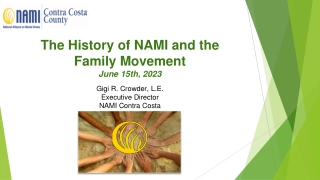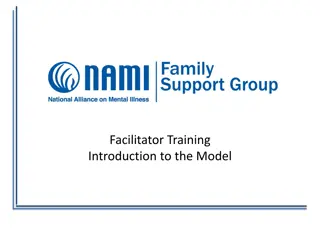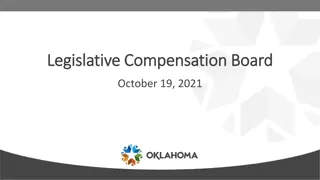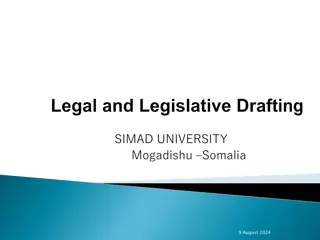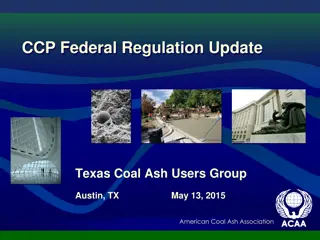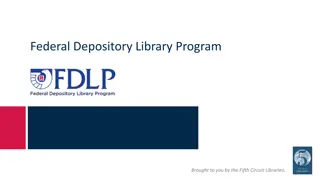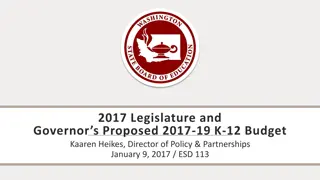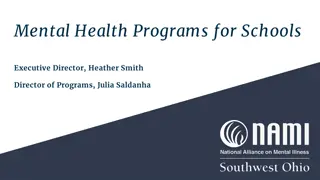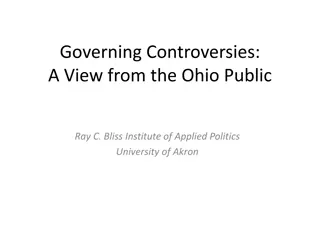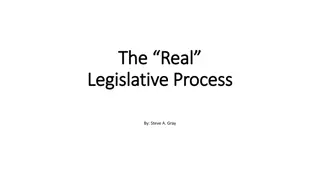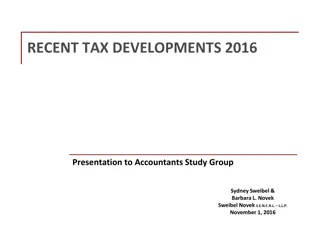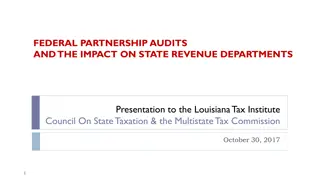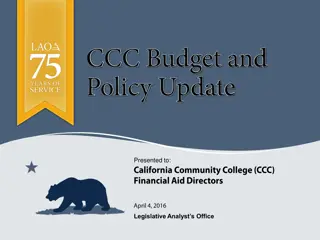NAMI Federal Legislative Agenda Update
This update covers key aspects of NAMI's federal legislative agenda, including opportunities in the final months of the Obama Administration, the two-year budget agreement, and details on the Budget Agreement, Ongoing NAMI priorities, FY 2016 Omnibus Spending Bill, and more.
Download Presentation

Please find below an Image/Link to download the presentation.
The content on the website is provided AS IS for your information and personal use only. It may not be sold, licensed, or shared on other websites without obtaining consent from the author.If you encounter any issues during the download, it is possible that the publisher has removed the file from their server.
You are allowed to download the files provided on this website for personal or commercial use, subject to the condition that they are used lawfully. All files are the property of their respective owners.
The content on the website is provided AS IS for your information and personal use only. It may not be sold, licensed, or shared on other websites without obtaining consent from the author.
E N D
Presentation Transcript
NAMIs Federal Legislative Agenda Andrew Sperling Director of Legislative Advocacy NAMI National andrew@nami.org
Opportunities in 2016? Final 11 months of the Obama Administration Two-year budget agreement now in place Major fiscal fights put off until 2017 Looming presidential campaign Role for mental health in the debate? Control of the Senate in 2016? House agenda under Speaker Ryan?
What is in the Budget Agreement? Debt ceiling is lifted through March 2017 BCA spending caps lifted by $80 billion for FY 2016 & FY 2017 Threat of sequestration eliminated for two years $50 billion for FY 2016, equally divided between defense and NDD, plus $16 billion from OCO $2 billion boost expected for NIH, including as much as $78 million for NIMH SSDI reallocation extends solvency for the SSDI Trust Fund through 2022 and implements new program integrity measures and expands work incentive demonstrations
Two-Year Budget Agreement Does this agreement eliminate all threats to Medicare, Medicaid, SSDI and discretionary programs through 2017? Ongoing NAMI priorities: Cuts to Medicaid Medicare Part D non-interference protection Higher LIS and dual eligible cost sharing Imposition of rebates for dual eligibles in Part D Avoiding further cuts to NDD beyond 2017
FY 2016 Omnibus Spending Bill $1.2 trillion bill covers all discretionary agencies and programs Overall $400 million increase for mental illness research, services and veterans programs NIMH -- $1.548 billion, $85.4 million increase above FY 2015 Overall $2 billion (7%) increase for NIH to $32 billion $150 million for the BRAIN Initiative, $85 million increase (Brain Research through Application of Innovative Neurotechnologies)
FY 2016 Omnibus Spending Bill SAMHSA -- $160 million increase, up to $3.8 billion $50 million increase for the Mental Health Block Grant program, up to $532.6 million -- Early intervention in psychosis set aside is increased from 5% to 10%-- with particular emphasis on replicating the NIMH RAISE study Assisted Outpatient Treatment (AOT) pilot funded at $15 million Most other SAMHSA programs level funded at FY 2015 levels: PATH ($64.6 million), Childrens MH ($117 million), PAIMI ($36.1 million), Primary-Behavioral Health Care Integration ($49.8 million), Garrett Lee Smith Suicide Prevention ($54.9 million), Mental Health First Aid ($15 million) $1.5 million for Mentally Ill Offender Treatment and Crime Reduction Act (MIOTCRA) grants at DoJ
FY 2016 Omnibus Spending Bill Supportive Housing programs at HUD $1.6 billion increase for HUD, but no resources for development of new permanent supportive housing (PSH) units Section 811 -- $150 million for renewal of existing PRAC subsidies (no funding for new units) McKinney-Vento -- $2.25 billion, $115 million increase, with $1.91.8 billion for Continuum of Care competition (up $27 million over FY 2015), $250 million for Emergency Solutions Grants
FY 2016 Omnibus Spending Bill Veterans Programs VA Medical Care NOT subject to discretionary spending caps or sequestration Funding allocated on a 2-year budget cycle $2.369 billion in additional forward funding for VA Medical Care for FY 2017 VA Mental Health -- $7.455 billion for FY 2016 and $7.715 billion in forward funding for FY 2017 v. $7.2 billion for FY 2015 in effect, a $255 million increase for the current fiscal year $630.7 billion for Medical and Prosthetics Research at the VA, a $41.8 million increase over current levels
21stCentury Cures & Medical Innovation HR 6 passed the House on July 10, 344-77 Major provisions: $9.3 billion NIH Innovation Fund, $1.75 billion in mandatory funding each year through 2020, Promoting patient-focused drug development, Streamlining clinical trials and accelerate development of new treatments, Codifying a structured framework at FDA for submission, review, and qualification of biomarkers and other drug development tools, Utilizing evidence from real world clinical settings, and Facilitating responsible communication of scientific developments related to off-label prescribing Senate HELP Committee set to act on February 9 Will be much narrower than HR 6 PDUDA VI negotiations will create an opportunity to pursue further changes in FDA regulatory policy to foster innovation in 2016 and beyond
Comprehensive Mental Health Reform HR 2646 Helping Families in Mental Health Crisis Act Introduced on June 4 by Representatives Tim Murphy (R- PA) & Eddie Bernice Johnson (D-TX), 178 bipartisan cosponsors including Franks, McSally, Salmon and Sinema Reported by the House Energy & Commerce Health Subcommittee 18-12 November 4 S 1945 Mental Health Reform Act Introduced on August 4 by Senators Bill Cassidy (R-LA) & Chris Murphy (D-CT), 15 bipartisan cosponsors HR 3722 & S 2002 Mental Health and Safe Communities Act Introduced October 8 by Representative Martha McSally (R-AZ) and Senator John Cornyn (R-TX)
Common Provisions in Both HR 2646 & S 1945 New Office of Assistant Secretary for Mental Health & Substance Abuse Same day billing in Medicaid for mental and physical healthcare services Mental Health Policy Laboratory within HHS to fund innovation grants that identify new and effective models of care and demonstration grants to bring effective models to scale for adults and children Grants for states to facilitate more effective integration of physical and mental health services Interagency Coordinating Committee on SMI Reform of Medicaid Institutions for Mental Disease (IMD) Exclusion for acute inpatient care MHPAEA compliance GAO report and new transparency requirements on federal enforcement in S 1945
Differences Between S 1945 & HR 2646 Reforms to the SAMHSA Mental Health Block Grant program 2% bonus allocation for Assisted Outpatient Treatment (AOT) implementation in HR 2646, new requirements for outreach & engagement to special populations in S 1945 HIPAA & FERPA reforms Statutory exceptions allowing disclosure in HR 2646, clarification of existing disclosure to family members and provider education in S 1945. Language from HR 2690 was added to Managers Amendment codifying OCR guidance and establishing a model training program for providers. Improvements to 42 CFR Part 2 added to HR 2646 Provisions only in HR 2646: Reforms at SAMHSA advisory councils and peer review Reforms to the PAIMI Protection & Advocacy program
What Fell Out of HR 2646 in Subcommittee? Elimination of 190-day lifetime limit on inpatient care in Medicare Part A (CBO - $3 billion over 10 years) Curbs on the ability of Part D plans to limit access to psychotropic medication (CBO - $700 million over 10 years) Expansion of the Excellence in Mental Health Act Section 223 State Demonstration ($1.8 billion over 10 years) Behavioral Health IT improvements Reforms to the Medicaid IMD Exclusion For facilities with average length of stay less than 20 days CBO score is pending
Mental Health and Safe Communities Act HR 3722 & S 2002 Mental health programs and related law enforcement and corrections programs, State compliance with federal mental health records requirements, Court-ordered assisted outpatient treatment, Pretrial screening and supervision, Behavioral health assessments and intervention, Forensic assertive community treatment, and Establishment of a National Criminal Justice and Mental Health Training and Technical Assistance Center Reforms NICS process?
Obama Executive Actions on Gun Violence Announced on January 5 Final rule published clarifying application of HIPAA to mental health records in the NICS Forthcoming Social Security proposed rule on sharing of the names of SSI & SSDI beneficiaries assigned Representative Payees with the NICS database Request in FY 2017 budget for $500 million in funding for mental health
More information at www.nami.org Questions? andrew@nami.org Join us at the 2016 NAMI convention July 6 9 in Denver!!!


